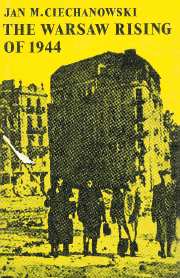Book contents
- Frontmatter
- Contents
- Abbreviations
- Acknowledgements
- Introduction
- Map
- 1 The Big Three and Poland: July 1943–July 1944
- 2 The Genesis of the Polish Resistance Movement
- 3 Attempts to Unify the Polish Resistance Movement
- 4 The Polish Grand Strategy, 1941–1943
- 5 The ‘Tempest’ Plan
- 6 The London Poles and ‘Tempest’
- 7 The ‘Tempest’ East of Warsaw
- 8 The Fate of Warsaw
- 9 Why Warsaw Rose
- 10 Warsaw and the Émigré Leaders
- Conclusions
- Bibliography
- Index
6 - The London Poles and ‘Tempest’
Published online by Cambridge University Press: 04 August 2010
- Frontmatter
- Contents
- Abbreviations
- Acknowledgements
- Introduction
- Map
- 1 The Big Three and Poland: July 1943–July 1944
- 2 The Genesis of the Polish Resistance Movement
- 3 Attempts to Unify the Polish Resistance Movement
- 4 The Polish Grand Strategy, 1941–1943
- 5 The ‘Tempest’ Plan
- 6 The London Poles and ‘Tempest’
- 7 The ‘Tempest’ East of Warsaw
- 8 The Fate of Warsaw
- 9 Why Warsaw Rose
- 10 Warsaw and the Émigré Leaders
- Conclusions
- Bibliography
- Index
Summary
Mikolajczyk's Response
Bor-Komorowski's decision to reveal to the Russians the Home Army troops which were to take part in the ‘Burza’ operations met with mixed reactions among the Polish circles in London. Mikolajczyk was amenable to the idea as a sound and realistic political move and was determined that it should be officially sanctioned by his Cabinet and the C-in-C. There were two main considerations which prompted the Prime Minister to accept Bor-Komorowski's decision without reservation; his desire ‘to manifest complete unity of opinion between the Government and the Home [authorities]’ and his desire ‘to provide the Government with an argument of great political importance in the current diplomatic talks with our Allies’. The Premier believed that approval of Bor-Komorowski's order would permit him to declare to the Allies Poland's readiness to collaborate with the U.S.S.R., in spite of the severance of Russo-Polish diplomatic relations. He hoped that such an offer might lead to the establishment of Russo-Polish military co-operation and consequently pave the way for a more far-reaching political modus vivendi with the Kremlin. Indeed, in Mikolajczyk's opinion this co-operation might create the ‘possibility of reaching an agreement with the Allies – Russia included – concerning the activities of the Homeland [i.e. the underground], securing arms, and taking over the administration of undisputed territories’. The conclusion of this type of agreement with the Soviet Union would have been highly favourable to the pro-London movement in Poland; it would have secured sovereign status for the Home Army by turning it into a legitimate Russian ally, and would have surrendered the administration of liberated territories to the agents of the secret state.
- Type
- Chapter
- Information
- The Warsaw Rising of 1944 , pp. 172 - 189Publisher: Cambridge University PressPrint publication year: 1974

